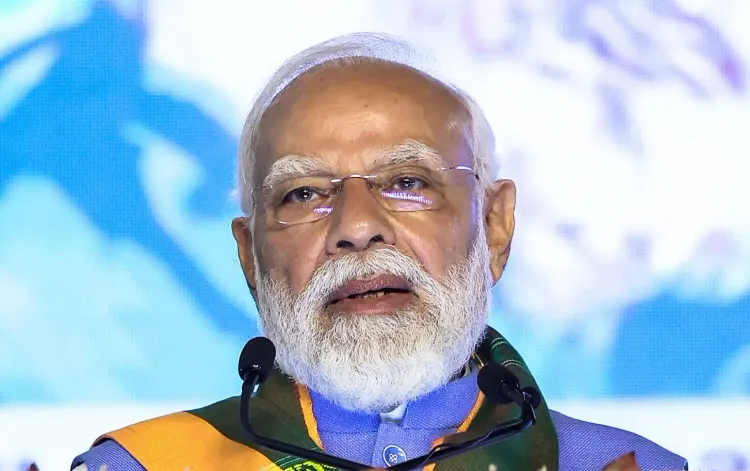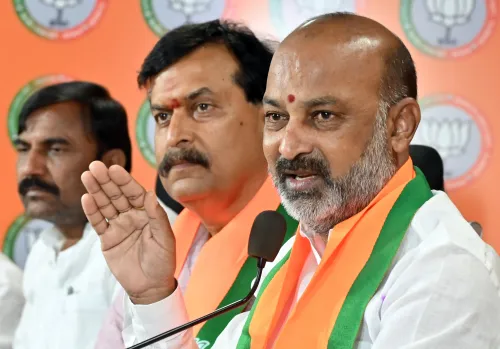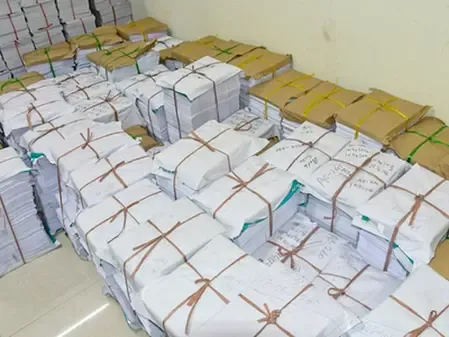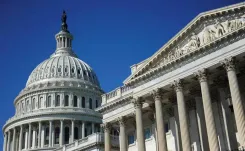Why is PM Modi Advocating for a Shift to Intercropping and Organic Farming in Coimbatore?

Key Takeaways
- PM Modi advocates a national shift to intercropping and organic farming.
- Coimbatore serves as a hub for natural farming.
- Government support includes substantial financial aid for farmers.
- Reducing reliance on chemical fertilizers is essential for sustainability.
- Reviving traditional food systems can enhance nutrition and culture.
Chennai, Nov 19 (NationPress) Prime Minister Narendra Modi on Wednesday called upon farmers nationwide to transition from monocropping to intercropping and adopt organic farming as a crucial element for the future of India's agriculture.
His remarks came during the inauguration of the South India Natural Farming Summit at the CODISSIA grounds in Coimbatore.
Beginning his address with references to local traditions, Modi expressed his respect for Maruthamalai Murugan, noting that Coimbatore is renowned for its compassion, culture, and industrial prowess.
“Coimbatore is the engine of South India’s industrial landscape and plays a significant role in the nation’s textile sector,” he stated.
The Prime Minister commended Tamil Nadu farmers for their perseverance, recalling that former Coimbatore MP C.P. Radhakrishnan now serves as the nation’s Vice-President. He emphasized that organic and natural farming hold a special place in his heart.
“Had I not participated in this summit today, I would have missed valuable learning opportunities,” he noted.
PM Modi highlighted that India is on its way to becoming a global center for organic farming, propelled by young farmers who are modernizing agriculture and bolstering the rural economy.
“In recent years, India’s agricultural exports have seen a twofold increase, indicating a transformative shift in the sector,” he explained.
Focusing on the government’s support for farmers, PM Modi mentioned that over Rs 10,000 crore was allocated this year through the Kisan Credit Card scheme alone.
The government also announced the distribution of the 21st installment of PM-KISAN, transferring Rs 18,000 crore to nine crore farmers.
“Small farmers have collectively received Rs 4 lakh crore under this initiative so far,” he remarked.
He pointed out that the reduction of GST on organic fertilizers has been beneficial for farmers, while excessive reliance on chemical fertilizers and pesticides has depleted soil fertility and escalated production costs.
“Organic farming is imperative for this century. It maintains soil health and mitigates ecological harm,” he stated.
Stressing the importance of reviving traditional food systems, the Prime Minister underscored the cultivation of millets, which have been integral to Tamil Nadu’s culinary heritage.
“We offer honey and thinai to Lord Murugan. These grains have sustained generations,” he added.
PM Modi described southern states as a “living agricultural university” for the nation and cited Kerala’s hill farmers who practice multilevel cropping by cultivating pepper and other crops alongside coconut and jackfruit trees.
He asserted that intercropping should evolve into a nationwide movement.
“Tamil Nadu cultivates organic crops across 35,000 hectares. Such progressive changes must be adopted throughout the country,” he urged.
He asserted that organic products should reach global markets and that agricultural education should incorporate natural farming practices.
He encouraged farmers to initiate an “organic revolution,” even if it begins on just one acre in a single season.
“Enhancing the organic farming market and fostering farmer self-reliance are vital, and the government is committed to supporting this endeavor,” the Prime Minister affirmed.









